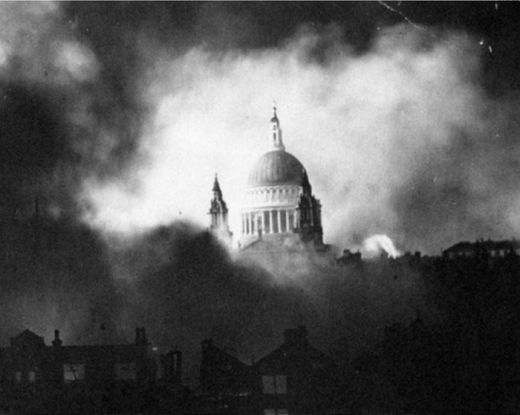24 August 1940: The Night That Hitler Lost The War August 24, 2010
Author: Beach Combing | in : Contemporary , trackback
The answer to the question of when the Third Reich doomed itself to extinction depends naturally on whom you ask. Some will tell you Germany’s failure to secure the Mediterranean in 1942 was crucial. Others will point to the invasion of the Soviet Union in 1941. Hitler’s possibly unnecessary declaration of war on the United States did not help. Then there were the faulty strategic decisions at the end of the war including Germany’s infatuation with rockets at the expense of fighter aircraft.
Beachcombing, however, wants to offer today a minority opinion: 24 August 1940, about eleven at night, when a handful of German bombers dropped a handful of bombs on the east end of London.
Today the casual reader might ask why bombing London should be comment worthy. After all, that is what the Germans did with panache through much of the war. But Hitler had always, prior to this attack, claimed that he would not bomb London without provocation. In fact, Hitler had a superficially civilised attitude to the bombing of civilian targets (with the important rider that they belonged to the short list of countries that he believed were ‘civilised’). He, later, in the war was to rave about the ‘barbaric’ allied bombing of German cities: in his political testament, written on the day before his death, he even talked (with a straight face) of the ‘hundreds of thousands of women and children… burned and bombed to death in their cities’.
Hitler admired Britain, he even had something of an inferiority complex in relation to that country, and did not want to escalate the war with the British Empire in 1940.
So why did Hitler order the Luftwaffe to bomb London on the night of April 24/25 1941?
Well, the easiest answer to that question is that he did not. Instead, a trail of German bombers dropped their bombs on London getting the wrong target in the dark. (For another opinion follow this link and scroll down towards the bottom of the page).
Churchill was, in any case, quick to react. London had been bombed and now Berlin would pay. On the evening of 25 April British bombers were sent to attack the German capital and, though the bombing was not particularly successful, Berliners had the novel experience of running for the shelters.
Hitler was furious and ordered reprisals against London that were eventually to come in early September. Goebbels wrote in his diary that ‘[Hitler] said he would repeat these raids night after night until the British were sick and tired of terror attacks. He shares my opinion absolutely that cultural centres, health resorts and civilian resorts must be attacked now. There is no other way of bringing the British to their senses. They belong to a class of human beings with whom you can only talk after you have first knocked out their teeth.’
Hitler’s rage was in part a result of having lost face with his own people. Having promised that no enemy aircraft would reach Berlin he now found that the British had made a fool of him. But his decision also came at a crucial point in the Battle of Britain and had unintended consequences.
In late August the Luftwaffe was intensifying its most devastating tactic, the bombing of British airfields.
Having been unable to knock the British out in the air Goering, the Luftwaffe’s commander, had decided that he would knock them out on the ground.
The tactic gave the Royal Air Force its worst moment of the war. As airfields went out of commission it looked increasingly likely that Fighter Command would have to pull out of the east and the south-east of England and regroup in the north and west.
The revenge attacks on London and other British cities gave British airfields desperately needed breathing space and allowed his Majesty’s Hurricanes and Spitfires time to reform as the holes in their runways were filled in.
There are even references to British fighter pilots guiltily expressing relief as they saw German bombers sweeping over London. The city and the country were paying a terrible price, but it was one that allowed the survival of Fighter Command.
On 24 August Germany still had a chance of winning the Battle of Britain and it would very probably have done so if it had kept on at the airfields instead of wasting bombs on London. The defeat of the RAF’s Fighter Command would have led to the possibility of a German invasion in September 1940.
Of course, it would not have been easy to invade the island even with German air superiority. The Germans would have had to slip around the Home Fleet (or bomb it to pieces) and then defeat Britain’s army on the beaches and ‘in the hills’. But victory over Britain would have become a long- or mid-shot possibility and with it the end of the Second World War. Hitler could have then turned with leisure to Stalin in the east, not having to worry about that greatest of German nightmares, the two front war. Stalin would have lost without British Imperial aid and by the time of Pearl Harbour Germany would have had most of Euro-Asia under its control.
Some faulty German navigation seventy years ago tonight perhaps saved European civilisation from its moustached enfant terrible.



